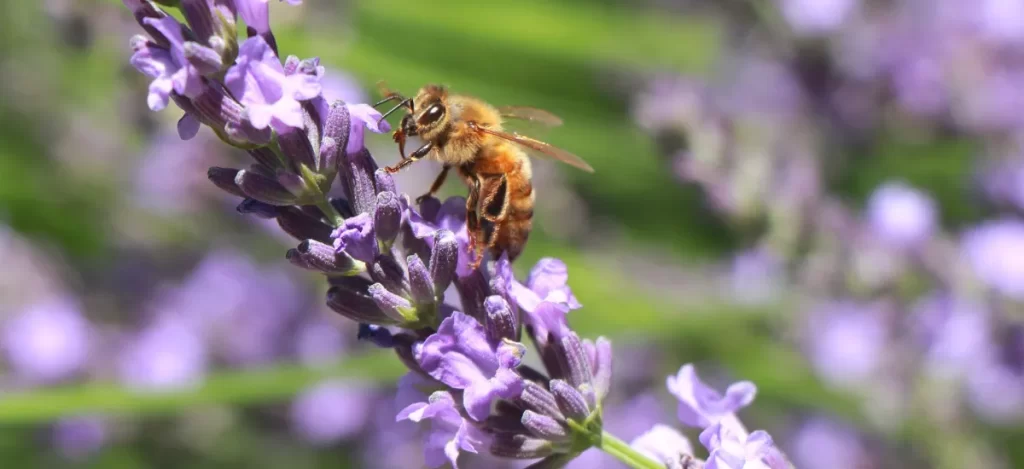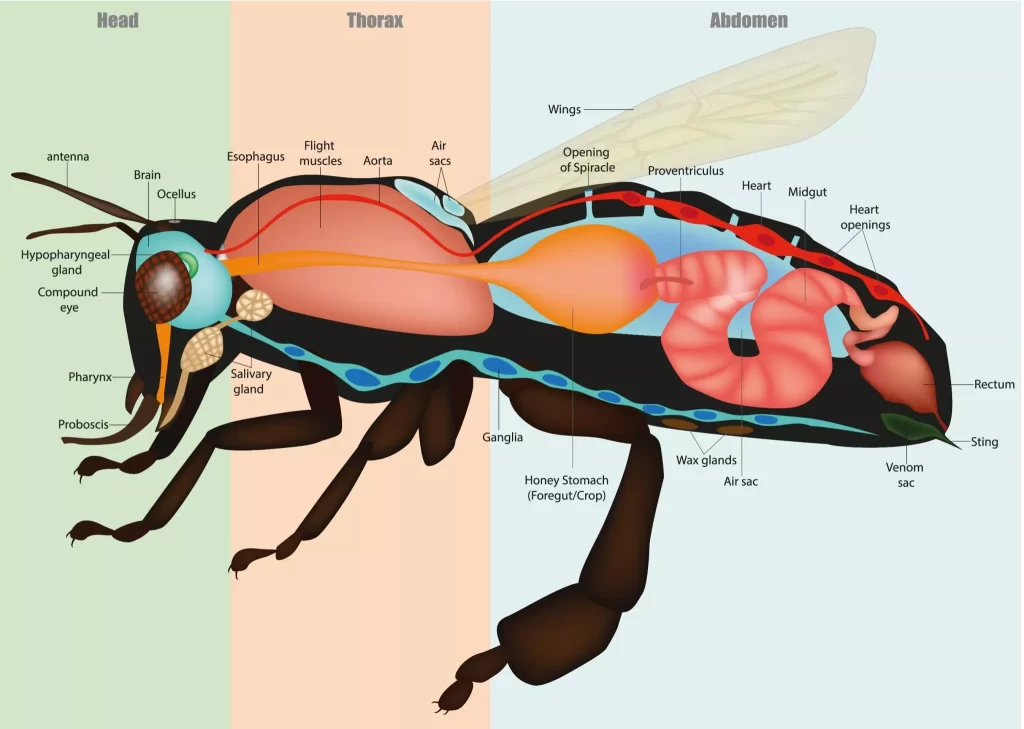Stories of beekeeping are generally enjoyable except perhaps a couple of topics concerning their digestive system, such as bee droppings, vomiting, or letting go of winds. Have you ever thought about whether bees poop, pee, fart and vomit and where their feces go?

Yes, like any living organism, bees produce waste from the food they eat and that waste has to go somewhere.
But do not forget this fact. Bees are insects that care a lot about hygiene and have rules for maintaining cleanliness and order in their home. The main house rule is: there is no bowel movement inside the hive.
You can breathe a sigh of relief now, can’t you?
Below you can read many interesting facts about what the digestive system of bees’ looks like, what it does and how it works, whether the bees poop, pee, fart, vomit, where the feces go and other interesting things on this topic.
How Often Do Bees Poop?
The digestive system of bees consists of three parts, the fore intestine, the middle intestine, and the hind intestine.
Fore intestine: Consists of bee mouth, esophagus and honey stomach.
Middle intestine: This is where the bee’s “real stomach” digests food.
Hind intestine: This includes the small intestine and rectum.
Every living organism is different and has different needs. Bees are not much different from humans when it comes to performing a large bowel movement. Bees poop as often as they need to. Bees can defecate several times a week. In the winter seasons they, can keep in their waste for months.
Unlike meat-eating animals, bee droppings are not smelly or offensive at all.
Do Bees Poop In Their Hives?
Bees defecate usually several times a week outside the hive. Bees can keep in feces for months when it is too cold to fly outside the hive.
The only situation when bees will defecate inside the hive is when they eat something that doesn’t go well with their tiny, tender stomachs. This can include when fruits are eaten during a state of scarcity, after consuming fermented honey or sugar syrup, or in case they feel unwell after being infected with a disease called nosema.
It is easy to notice this problem in your hive, because there will be oblong traces of dysentery on and around the hive.
The queen is the only bee that poops inside the hive. The worker bees take care of its cleaning and maintain the hive well.
What Does Bee Poop/Droppings Look Like?
Most bees excrete a sticky yellow substance that contains more pollen than anything else. Bee droppings contain pieces of undigested pollen fat, pollen grains of visited flowers and other waste.
It is often light yellow in color, but the actual hue may vary depending on the diet of the bees.
Bee droppings are not harmful to humans or other animals.
Do Bees Poop While Flying?
It turns out that bees defecate while looking for pollen or nectar.
The longer a bee needs to feed on a flower, the more likely it is that the feeder will defecate.
Some factors that affect how long a bee spends on a particular flower include corolla depth, nectar concentration and viscosity, and whether the bee collects nectar or pollen. Complex flowers consist of many small flowers, so food collectors have to move from flower to flower, which takes more time.
Do Bees Poop Beeswax?
Beeswax is not bee droppings. Beeswax is produced by young bees that are 10 to 20 days old after leaving the honeycomb cell. They have eight wax glands located inside their fourth to seventh abdominal plate.
The wax glands are activated by young bees eating honey to produce tiny wax flakes which they then chew and shape into honeycomb cells.
Are Bee Droppings Poisonous?
No, bee droppings are not poisonous. That’s all you may or may not have wanted to know about bee droppings. If you are ever hit by ‘yellow rain’ when the bees first emerge from the nest in the spring, you will know what it is.

Do Bees Fart?
Experts differ on whether bees really fart. One group of experts is of the opinion that the fibers found in pollen and honey trap air bubbles as they move through the digestive system of bees, which when released can come out in the form of winds.
Another group of experts doubts this theory.
From what I found on various forums where they write about this topic, some biologists agree with the first opinion, so that bees still let the wind.
Do Bees Pee?
Bees are insects and must store as much water as possible to prevent drying out. So, bees don’t pee. They instead produce uric acid which mixes with other wastes before passing through their bodies.
Uric acid contains very little water, so the bee can get rid of it for sure. The amount of uric acid that a bee excretes is very small, so it is usually difficult to see. Uric acid from bees is white and looks like bird droppings.
Can Bees Have Diarrhea?
Yes, honey bees can get diarrhea and this can lead to the decline of bee colony.
There are two causes of diarrhea of honey bees:
● Pathogens, such as nosema.
Nosema is a viral fungus that disrupts digestion in the bee’s middle intestine. Once one bee is infected, the entire hive is endangered. Nosema is especially harmful during the winter.
● Fibers accumulation in the intestines of the honey bee.
During the cold months bees cannot do their usual “cleansing” and over time the fibers contained in honey and pollen accumulate in the intestines of the honey bee. When warmer weather occurs, the honey bee can drink too much water which binds to the fibers and mainly causes diarrhea in bees.
Do Bees Vomit?
Many people think that bees vomit to make honey, but this is not true. Bees make honey from nectar that they store in their honey stomach. The nectar then returns and is transferred between other worker bees that evaporate moisture by flapping their wings.
If the nectar bypasses the bee’s honey stomach and goes into the middle intestine for digestion, it cannot be recovered. In other words, it is impossible for a bee to recover or return nectar from its digestive stomach to the honey stomach located in the esophagus.
And Finally: Is Honey Actually Bee Droppings?
No. Don’t worry. Honey is mainly produced from nectar collected by bees during a flower trip. The honey bee returns nectar to the hive in its crop, where it is transferred from bee to bee, adding to the bee’s own ingredient (bee enzyme) before it settles in a cell made of wax where it will turn into honey.
Read more about this process: How Bees Make Honey?
END
Was this article interesting to you? I believe it was. You will find many interesting facts if you start researching a little.
Originally I only wanted to write an article about the digestive system of bees. But then questions like these started to arise, do bees poop, pee, fart, vomit… It was funny to me what kind of things can come to mind. But you are certainly interested in the same.
What fascinates me the most is how long bees can keep feces in an effort to keep their hive clean. Weeks, months. They wait patiently for warm weather to make sure they rush off for a short flight to clean up and relieve themselves.
But every other question carries an interesting answer.
And yes, the most important thing for honey lovers. Honey is not bee droppings. Whoever told you that made a joke with you a little or thought it to be so. Hm…
Until new topics and interesting facts, stay honeyed!

